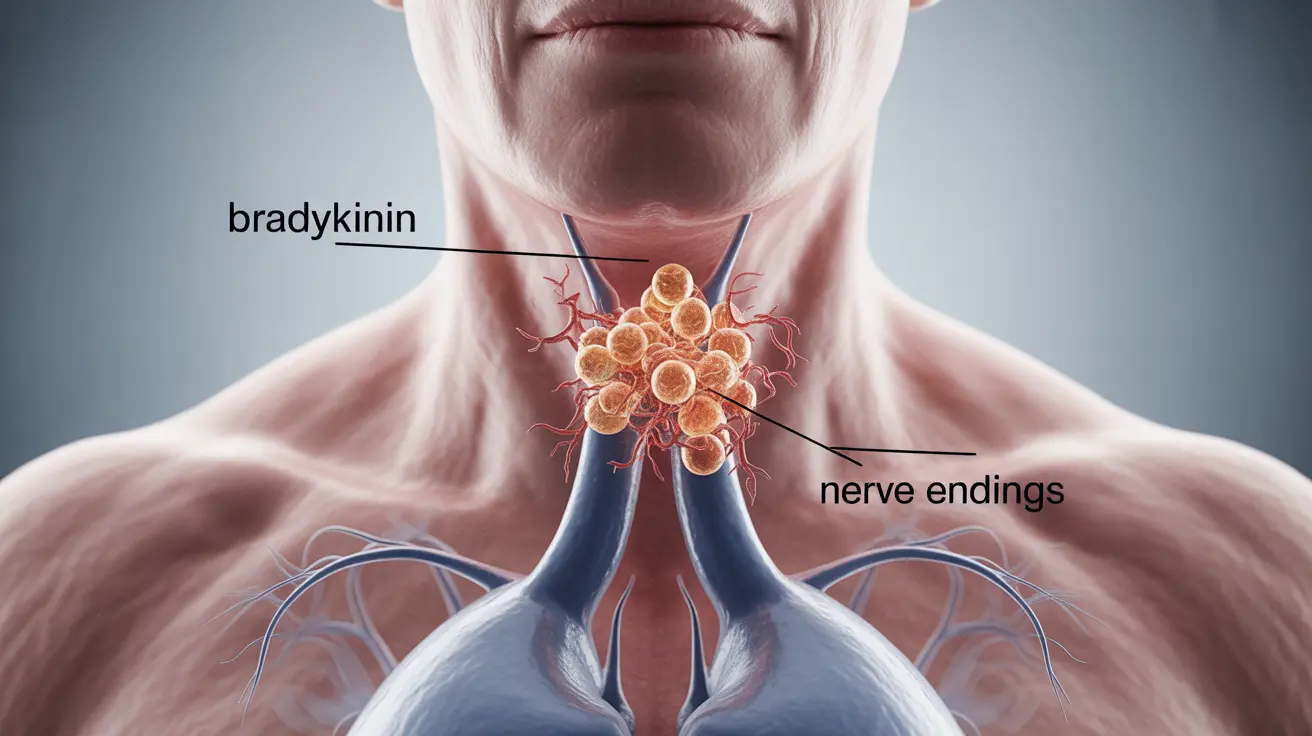If you're experiencing a persistent sensation of phlegm in your throat while taking ACE inhibitors for blood pressure control, you're not alone. This common side effect affects up to 35% of patients taking these medications. Understanding why this occurs and knowing how to manage it can help you maintain your necessary blood pressure treatment while improving your comfort.
While this side effect can be bothersome, it's important to know that it's typically not dangerous and there are various ways to manage it. Let's explore why this happens and what you can do about it.
How ACE Inhibitors Cause Throat Symptoms
ACE inhibitors work by blocking an enzyme that normally breaks down bradykinin, a natural substance in your body. When bradykinin builds up, it can irritate nerve endings in your airways, leading to that persistent sensation of phlegm in your throat and a dry cough.
This reaction is not actually producing more phlegm – instead, it's creating a sensation that feels like there's something in your throat that needs to be cleared. This distinction is important for understanding how to manage the symptom effectively.
Managing Throat Symptoms While Taking ACE Inhibitors
Immediate Relief Strategies
Several approaches can help minimize the sensation of phlegm in your throat:
- Staying well-hydrated with water throughout the day
- Using a humidifier in your bedroom
- Sucking on sugar-free lozenges
- Trying honey and warm water mixtures
- Practicing gentle throat-clearing techniques
Long-term Management Approaches
For ongoing management of throat symptoms, consider these strategies:
- Taking your medication at a different time of day
- Asking your doctor about reducing your dosage
- Maintaining good oral hygiene
- Avoiding triggers like dry air or irritants
When to Seek Medical Attention
While phlegm sensation and cough from ACE inhibitors are usually harmless, certain situations warrant medical attention:
- Severe or worsening cough that disrupts sleep
- Difficulty breathing or wheezing
- Throat pain or difficulty swallowing
- Cough lasting more than three months
- Development of other concerning symptoms
Alternative Medication Options
If throat symptoms become too bothersome, several alternative blood pressure medications are available:
- Angiotensin Receptor Blockers (ARBs)
- Calcium Channel Blockers
- Beta Blockers
- Diuretics
Your healthcare provider can help determine the most appropriate alternative based on your individual health needs and risk factors.
Frequently Asked Questions
Why do ACE inhibitors cause a sensation of phlegm or a persistent dry cough in the throat?
ACE inhibitors cause this sensation by preventing the breakdown of bradykinin in your body. When bradykinin accumulates, it irritates nerve endings in your airways, creating a sensation of phlegm and triggering cough reflexes, even though no excess phlegm is actually being produced.
How can I manage or reduce the feeling of phlegm in my throat caused by ACE inhibitor medications?
You can manage this sensation by staying well-hydrated, using a humidifier, trying throat lozenges, and practicing gentle throat-clearing techniques. Some people find relief by taking their medication at different times of day or asking their doctor about dose adjustments.
When should I be concerned about phlegm in my throat if I am taking blood pressure medicine like ACE inhibitors?
Seek medical attention if you experience severe coughing that disrupts sleep, difficulty breathing, throat pain, difficulty swallowing, or if the cough persists for more than three months. These symptoms might indicate a need for medication adjustment or further evaluation.
Are there alternative blood pressure medications if ACE inhibitors cause throat irritation or persistent cough?
Yes, several alternatives exist, including Angiotensin Receptor Blockers (ARBs), Calcium Channel Blockers, Beta Blockers, and Diuretics. Your healthcare provider can help select the most appropriate alternative based on your specific health needs.
What are the other common causes of phlegm sensation in the throat besides medication side effects?
Other common causes include acid reflux, post-nasal drip, allergies, sinus infections, viral infections, smoking, and environmental irritants. If you're experiencing throat symptoms, it's important to identify the underlying cause for proper treatment.




